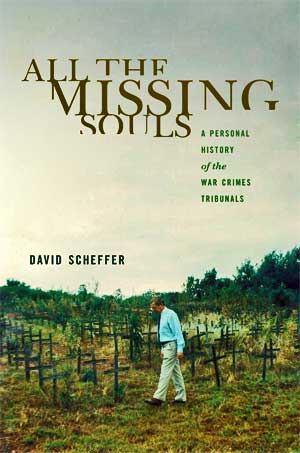
Leadership impunity for the commission of atrocity crimes is on the losing side of history now.
To understand why the highest political and military leaders are increasingly at risk of indictment and prosecution today—why Muammar Gaddafi and his son Saif Al-Islam were indicted by the International Criminal Court last year, why Sudan’s current president, Omar Al-Bashir, was indicted for genocide in Darfur and defies to this day the authority of the same court, why Radovan Karadzic and Ratko Mladic are finally standing trial in The Hague before the Yugoslav Tribunal, why former Liberian President Charles Taylor awaits the judgment of the Special Court for Sierra Leone, why three of the surviving top Khmer Rouge leaders of the Pol Pot regime are on trial today in Phnom Penh—requires looking back to the turbulent decade of the 1990s.
All the Missing Souls is the story of this transformational moment in history, a personal account of the creation and rise of five major war crimes tribunals during the 1990s, and it is also about the atrocities that shaped their mandates.
I write in the book that what happened was “one of the most ambitious judicial experiments in the history of humankind—a global assault on the architects of atrocities—found its purpose as mass killings and ethnic cleansing consumed entire regions of the earth. The grand objective since 1993 has been to end impunity at the highest levels of government and the military not only for genocide, which captures the popular imagination with its heritage in the Holocaust, but also for the far less understood offenses of crimes against humanity and war crimes.”
I had the lead American job, as the U.S. Ambassador at Large for War Crimes Issues and before that as senior counsel to America’s ambassador to the United Nations, Dr. Madeleine Albright, in building the International Criminal Tribunals for the former Yugoslavia and Rwanda, the Special Court for Sierra Leone, the Extraordinary Chambers in the Courts of Cambodia, and the permanent International Criminal Court.
So the book is an insider’s account of eight years of American and international policy-making in response to mass atrocities and the demand for justice in the aftermath. The narrative is both self-critical and comprehensive, guiding you through the daily diplomatic jousts and investigative challenges of international justice, where political calculations and pressures constantly dance with judicial imperatives.
I wrote All the Missing Souls over a three-year period, from 2007 through 2010. I waited to write this personal history because I aimed to describe the rapid evolution of international justice during the 1990s through my own reflective prism of experience. I wanted the dust to settle so I would be honest and self-critical. This is a much more compelling and introspective book now in 2012 than it would have been if I had written it in 2001 right after leaving government service.
All the Missing Souls explains for the general reader atrocity crimes in the modern understanding—genocide, crimes against humanity, and war crimes—and the unique law that frames these crimes in the tribunals’ jurisprudence, which I introduce as atrocity law.
You will emerge from the book knowing not only the true character of each major war crimes tribunal but also how they compare with each other and the human story behind each one.
While there are many books that relate the terrible atrocities that occurred in Rwanda, the Balkans, and west Africa during the 1990s, as well as Cambodia under the Pol Pot regime, All the Missing Souls tells the story of how legal theories about justice were activated to bring the perpetrators of mass crimes to justice in freshly conceived tribunals after the long drought of the Cold War for such politically sensitive endeavors.
All the Missing Souls is about discovering the right formula to confront monstrous evil in the courtroom—in ever-changing international circumstances.
Consider the challenge in the early 1990s: Mass atrocities, leadership perpetrators, usually an ongoing and vicious armed conflict or at least a potentially resurgent one, a destroyed or failed court system, unwilling political leaders, and a skeptical international community much more focused on the peace or war equation of the conflict itself. That was the scenario facing me in so many atrocity zones. Cambodia was different only in that the atrocities had long ended, but the infrastructure was lacking and political landmines were all over the place.
I was not starting from scratch—there had been the Nuremberg and Tokyo military tribunals decades earlier. But mine was a very different challenge under far more complex circumstances. This would not be victors’ justice, although some have viewed it as the powerful imposing justice upon the weak. Modern international justice is no simple code of criminal procedure either. The quest for justice meanders back and forth between international and domestic courts. Yet the search for evil aimed for the civility of the courtroom and in the growing resolve that removing war criminals from politics and military leadership would make a difference.
I also provide insight into how Washington failed to confront genocide in Rwanda in 1994 and at Srebrenica in 1995, and how we failed to capture some top indicted fugitives of the Yugoslav Tribunal during my watch as the top war crimes envoy. But I learned key lessons that shaped different outcomes in Kosovo in 1999 and in Sierra Leone in 2000 and in the building of the International Criminal Court.
I was the Ambassador to Hell, but also the Ambassador to Hell and back. In my more optimistic moments, I thought of myself as a carpenter of war crimes tribunals. These courts would be the international community’s frontal assault on leadership impunity, and by the end of my watch it was much harder to make the case for immunizing masterminds of atrocities from justice.
Pages 2 through 5 state what the book is about, its objectives, the historical significance of the story, and my role in it. Allow me to stitch together some of the key passages here:
The futile slogan of “never again” after World War II collapsed under the weight of atrocity crimes occurring again and again…. The task was not to construct a new legal order of perfect justice where every war criminal from the top leaders on down to the foot soldiers would be prosecuted. Rather, the challenge centered on building tribunals that would hold political and military leaders to account for the atrocity crimes unleashed on innocent civilian populations for which they were primarily responsible…. [W]hat follows is a historical narrative of how international justice evolved exponentially during the decade of the 1990s and into the twenty-first century and brought to an end the presumption of impunity for atrocity crimes. It is the story of the political decisions that shaped the tug-of-war between peace and justice during that dynamic period in world history.
In the pages 264 to 266 I describe my days on the Kosovo-Macedonian border in April 1999, as thousands of Kosovar-Albanians fled Serb terror and crowded into fields of utter misery and despair. I also recount in these pages what I wrote in my notes immediately thereafter—that raw reaction, without any refinement of the clearance process in Washington, is a good snapshot of what one encounters throughout the book.
Typically, lawyers and jurists who write about this historic and fast-paced evolution of international law serve a very narrow group of interested professionals. I want to bring the story of international justice in our own time to a wide audience of readers. So the book is populated with the famous and the unknown, the story line transporting the reader deeper into the killing fields and negotiating arenas of international justice.
All the Missing Souls is a book of revealing horror and also exceptional hope. I want the reader to understand that from the darkness of atrocities there can emerge both retribution against those responsible and the building of peaceful societies alongside the creation of war crimes tribunals.
The end of leadership impunity is within sight now. The cynics may counsel against the idealism of law defeating the instincts of murderous tyrants. But here we had a decade when five new war crimes tribunals came to pass, and justice began to prevail. If the public grasps the significance of this transformational moment in history, there is no turning back.


David Scheffer is the Mayer Brown/Robert A. Helman Professor and Director of the Center for International Human Rights at Northwestern University School of Law. He was the U.S. Ambassador at Large for War Crimes Issues between 1997 and 2001, and senior adviser and counsel to the U.S. Permanent Representative to the United Nations, Dr. Madeleine Albright, between 1993 and 1996. Scheffer led the U.S. delegation to U.N. talks establishing the International Criminal Court. Foreign Policy listed him among the “Top Global Thinkers of 2011.”